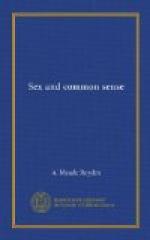And to the others I would say this. If the homosexual is still the most misunderstood, maltreated, and suffering of our race, it is due to our ignorance and brutal contempt. How many have even tried to understand? How many have refrained from scorn? Other troubles have been mitigated, other griefs respected if not understood. But this we refuse even to discuss. We are content to condemn in ignorance, boasting that we are too good to understand. In consequence, though a few here and there have preached homosexuality as a kind of gospel, far more have suffered an agony of shame, a self-loathing which makes life a hell.
To be led to believe that one is naturally depraved!—to be condemned as the worst of sinners before one has committed even a single sin! Is that not the height and depth of cruelty? Do you wonder if here and there one of the stronger spirits among these condemned ones reacts in a fierce, unconscious egotism and proclaims himself the true type of humanity, the truly “civilized” man? How shall they see clearly whom we have clothed in darkness, or judge truly who are so terribly alone?
To have a temperament is not in itself a sin! To find in your nature a disharmony which you must transcend, a dislocation you have to restore to order, is not a sin! Whose nature is all harmony? Whose temperament guarantees him from temptation? Is there one here who is not conscious of some dislocation in his life that he must combat? Not one!
It is a disharmony to have an active spirit in a sickly body. It is a disharmony to have, like one of the very greatest of Christ’s disciples, “a thorn in the flesh to buffet him.” Who shall deliver us from this body of death? When you hear of a Beethoven deaf or of a Robert Louis Stevenson spitting blood, are you not conscious of disharmony? Where there is perfect harmony—perfect, I say—such a dislocation could not be. Epilepsy has been called “la maladie des grands,” because some great ones have suffered from it. Perhaps St. Paul did. It is not possible to imagine Christ doing so. In Him there existed so perfect a harmony of being that one can no more associate Him with ill-health than with any other disorder or defect. Yet we do not speak (or think) with horrified contempt of the disharmony present in St. Paul or in Beethoven. Rather we reverence the glorious conquest of the spirit over the weakness and limitations of the flesh. Some of us have even rushed to the opposite extreme and preached ill-health as a kind of sanctity, in our just admiration for those who have battled against it and shown us the spirit dominant over the flesh.




